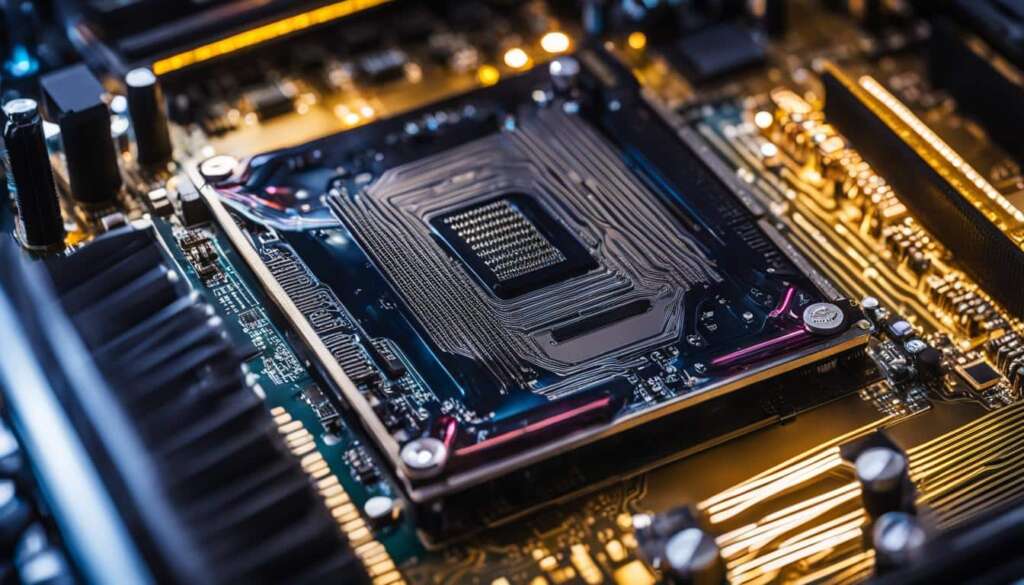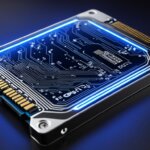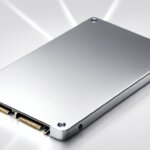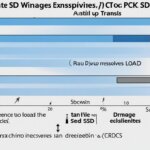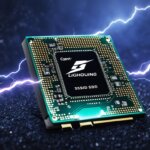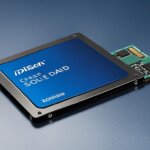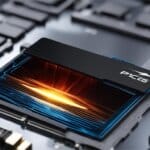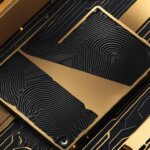Table of Contents
Modern computing has gone through tremendous changes over the decade, with several technologies emerging to support the rise of artificial intelligence and machine learning. Among these is PCIe SSDs, a product of the evolution of storage technology.
PCIe SSDs have been championed as the future of storage devices, providing a new level of speed and performance. In this section of our article, we will explore the basics of PCIe SSDs and what makes them unique in the storage technology ecosystem.
PCIe SSD stands for Peripheral Component Interconnect Express Solid-State Drive. Unlike traditional Hard Disk Drives (HDDs) or SATA-based Solid State Drives (SSDs), PCIe SSDs use the Peripheral Component Interconnect Express (PCIe) interface to connect to the motherboard.
PCIe SSDs draw power straight from the motherboard, allowing them to operate without additional cables or power connectors. This helps to reduce the amount of clutter within your computer and eliminate the need for power-intensive storage options.
PCIe SSDs also offer faster data transfer rates and lower latency, enabling them to access data quickly and more efficiently. This makes them ideal for use in high-performance computing environments where speed is critical.
Advantages of PCIe SSDs
The benefits of PCIe SSDs cannot be overestimated, as they significantly improve performance compared to other storage technologies. Their faster read and write speeds, low power consumption, and high durability make them ideal for use in high-performance computing environments.
Using a PCIe SSD can have a significant impact on your computer’s overall responsiveness and application loading times. Not only that, but PCIe SSDs are also ideal for gaming enthusiasts who require fast read speed times to have a smooth gaming experience.
Key Takeaways
- PCIe SSDs are the future of storage devices, providing faster data transfer rates and reduced latency.
- PCIe SSDs connect to motherboards using the Peripheral Component Interconnect Express (PCIe) interface.
- PCIe SSDs offer faster read and write speeds, low power consumption, and high durability.
- Using a PCIe SSD can have a significant impact on your computer’s overall responsiveness and application loading times.
- PCIe SSDs are ideal for gaming enthusiasts who require fast read speed times.
What is PCIe SSD?
In the world of data storage technology, PCIe SSDs have emerged as game changers. In this section, we will provide a comprehensive understanding of these devices, delving into their features, benefits, and differences from traditional storage devices such as Hard Disk Drives (HDDs) and SATA-based Solid State Drives (SSDs).
As you might have guessed, PCIe SSDs are Solid State Drives that use the PCIe interface to connect to a computer’s motherboard. This interface provides a direct connection to the CPU, which makes the data transfer rate much faster than traditional storage devices that rely on SATA.
One of the key benefits of PCIe SSDs is their faster data transfer rates. This is because they use a direct connection to the CPU, which results in reduced latency, ensuring that data is accessed and processed more quickly. Since these drives do not have any spinning disks, they are also more durable than traditional HDDs and are less prone to mechanical failure.
Table: Key Differences Between PCIe SSD, SATA SSD, and HDD
| Feature | PCIe SSD | SATA SSD | HDD |
|---|---|---|---|
| Data Transfer Rate | Up to 32 GB/s | Up to 6 GB/s | Up to 2 GB/s |
| Access Time | Less than 0.1 ms | Approx. 0.2 ms | Approx. 20 ms |
| Durability | High | High | Low |
| Power Consumption | Low | Low | High |
As shown in the table above, PCIe SSDs offer significant advantages over traditional storage devices. Their data transfer rates are much faster, and they require less power, making them more energy-efficient. They are also more durable and have a longer lifespan, reducing the total cost of ownership over time.
Overall, PCIe SSDs are transforming storage technology, enhancing speed and performance in computing, and providing benefits that are unmatched by traditional storage devices. They are ideal for use in high-performance computing, gaming, and other industries where fast data access and transfer rates are critical.
Advantages of PCIe SSDs
PCIe SSDs have revolutionized the storage world by advancing the speed and performance of computing. Compared to traditional storage devices like Hard Disk Drives (HDDs) and SATA-based Solid State Drives (SSDs), PCIe SSDs offer a host of advantages.
Enhanced performance
One of the most significant advantages of PCIe SSDs is enhanced performance. PCIe SSDs have faster read and write speeds than other storage technologies, ensuring faster data access. This increased speed leads to quicker system responsivity and improved application loading times.
Reduced power consumption
PCIe SSDs consume less power than other storage devices. This is because they use a direct connection to the motherboard and do not require a power-hungry intermediary. The reduced power consumption leads to lower system heat output and increased system reliability.
Increased durability
PCIe SSDs have greater durability in comparison to other storage technologies. Unlike HDDs, PCIe SSDs do not feature any moving mechanical parts, which makes them less prone to physical damage caused by drops or bumps. PCIe SSDs are also built with solid-state components, making them resistant to vibration and other environmental factors.
Overall, PCIe SSDs offer a superior storage solution for any computing system that demands high performance and faster data access, while minimizing power consumption and increasing durability. Their advantages make them a popular choice for those who require quick and reliable computing systems.
Conclusion
Overall, PCIe SSDs represent a significant development in the world of Rapid Storage Tech. They offer faster data transfer rates, reduced power consumption, increased durability, and most importantly, enhanced performance in comparison to traditional storage technologies such as Hard Disk Drives (HDDs) and SATA-based Solid State Drives (SSDs).
As we have seen, PCIe SSDs have several advantages that make them an attractive option for businesses and individuals looking to improve computing speed and efficiency. Their impact on overall system responsiveness and application loading times cannot be overstated.
Looking ahead, PCIe SSDs are expected to continue to shape the future of storage technology, with potential applications in various industries, including gaming, media production, and data centres. As PCIe SSDs become more commonly used, we can expect them to become even faster and more efficient, further solidifying their place as the go-to storage option for those seeking optimal performance and reliability.
FAQ
What is a PCIe SSD?
A PCIe SSD, or Peripheral Component Interconnect Express Solid State Drive, is a storage device that uses the PCIe interface to connect directly to the motherboard of a computer. It is a type of solid-state drive that offers faster data transfer rates and reduced latency compared to traditional storage devices like hard disk drives (HDDs) and SATA-based SSDs.
How does a PCIe SSD differ from other storage devices?
Unlike HDDs and SATA-based SSDs, PCIe SSDs connect directly to the motherboard via the PCIe interface, allowing for faster data transfer rates and reduced latency. PCIe SSDs use the high-bandwidth PCIe lanes, enabling them to offer significantly faster read and write speeds. Additionally, PCIe SSDs do not require cables or connectors, leading to a more streamlined and efficient storage solution.
What are the advantages of using PCIe SSDs?
PCIe SSDs offer several advantages over other storage technologies. They provide enhanced performance, thanks to their faster data access and reduced latency. PCIe SSDs also have higher endurance and durability, making them ideal for heavy workload environments. Additionally, PCIe SSDs consume less power compared to traditional storage devices, resulting in improved energy efficiency.

